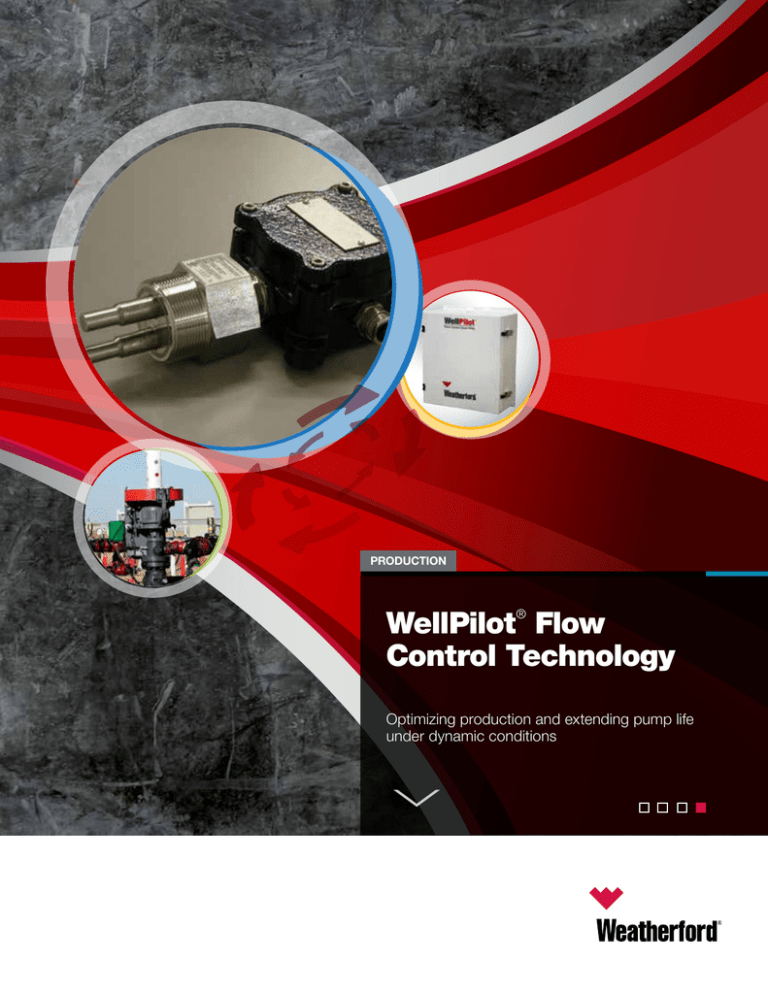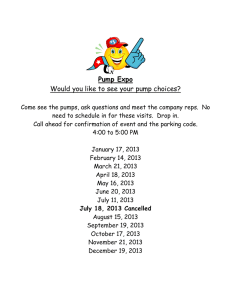
PRODUCTION
WellPilot® Flow
Control Technology
Optimizing production and extending pump life
under dynamic conditions
In continually changing conditions,
can your PCP go with the flow?
When you use a progressing cavity pump (PCP) to enhance
recovery, changes in well conditions can do worse than hinder
production—they can wreak havoc on the pump. So for steady and
reliable performance, it’s essential that you properly monitor and
regulate the pump speed. Pump too fast, and you risk outpacing
well inflow, which can lead to pump off and consequential pump
failure. On the other hand, if you pump more slowly to avoid pump
off, you can reduce production to levels far below the well’s potential.
WellPilot® flow control technology (FCT) eliminates the guesswork
and optimizes PCP performance.
Introducing the next generation
of automated pump control.
Exclusive technology gives you the
power to fine-tune your PCP.
Used in conjunction with a variable-speed controller, the
Weatherford WellPilot FCT continuously fine-tunes pump speed
to achieve optimal production and protect the system against
flow losses. It’s a versatile, affordable, and effective solution.
And it’s only from Weatherford.
The WellPilot FCT has no moving parts. Based on the principle of
thermal cooling, our proprietary system uses two stainless-steel
probes to determine changes in flow rate. One probe generates
heat and detects heat absorption, while the other is unheated
and acts as a high-precision thermometer. The probes alternate
roles periodically, switching between heated and unheated
functions, to deter scale and paraffin buildup.
To determine flow rates, the heated probe detects how much
heat is being absorbed by the passing fluid. The higher the flow,
the more heat is absorbed, which creates a greater cooling
effect. The unheated probe helps fine-tune the flow detection
by reading the fluid’s ambient, in-motion temperature. Using
a patented Weatherford algorithm, the controller continually
analyzes changes in temperature readings from the probes.
Based on this information, it automatically signals the variablespeed drive to adjust pump speed in relation to the production
capabilities of the well.
Plus, because gas absorbs heat at a much lower rate than oil
or water, the WellPilot FCT can easily identify gas in the flow line
and make automatic adjustments to avoid a pumpoff condition.
This provides the kind of added assurance that you just can’t get
from conventional flow-measurement devices.
2 © 2016 Weatherford. All rights reserved.
Flow Control Probes
Quick and easy installation. Long-lasting benefits.
FCT/PCP Control Interface
PCP
Progressing Cavity Pump
FCT Probe Connection
(9 wire)
WellPilot VSD
WellPilot FCT
Variable-Speed Drive
Flow Control Technolgy
FCT Speed Control
4- to 20-mA Out
FCT Auxilliary
Input 4- to 20-mA
FCT Power Supply
120 to 240 Vac or 12 Vdc
The easy-to-install WellPilot
FCT probe is fitted into a
standard 2-in. threaded
connection, so plumbing
requires only a pipe wrench.
To achieve best results, the
WellPilot FCT unit is installed
downstream of the wellhead, on
the bottom side of the pipe, in a
location where the pipe will be
full during operation.
Modbus Communication Port
© 2016 Weatherford. All rights reserved.
3
Precise, auto-adjusting flow control
to maximize your production.
The WellPilot FCT is an autocalibrating instrument. Once
installed and powered on, it begins controlling the well
immediately. The objective is to always operate the pump at
the lowest speed required to deliver maximum production from
a well. To find this speed, the WellPilot FCT follows a patented
process called “climb and double-back.” This process achieves
optimal control and reliability for your PCP.
4 © 2016 Weatherford. All rights reserved.
Climb and double-back process
optimizes pump speed and flow rate.
To help get fluid to the surface faster, you can configure the
WellPilot FCT to start at a higher speed when it is powered on
or reset—and then to maintain that speed for a predetermined
amount of time. After that time has elapsed, or once fluid has
been detected at the surface, the system automatically begins
to build a progressive pump speed/measured temperature table,
starting at your preset minimum speed. This table is visible on
the FCT controller display.
Climb and Double-Back Table
If an increase in pump speed causes the flow rate to decline,
or if the flow rate remains unchanged as a result of a speed
increase, WellPilot FCT automatically compensates. It doubles
back, searching through its progressive table of climbing speeds
and corresponding flow rates, comparing the current flow rate
to those observed at lower speeds. It then starts the climbing
process again, selecting the lowest recorded speed that resulted
in a flow rate at or above the current production rate of the well.
In this way, the controller uses temperature values to determine
the control action that will best optimize the well.
Typical WellPilot FCT Control
Example of Typical Operation
Pump RPM
Temperature
100
73°F (23°C)
119
72°F (22°C)
↓
↓
↓
↓
400
64°F (18°C)
160
140
120
RPM
Climb
180
100
80
60
Double-Back
Production
Pump Speed
40
20
The table above shows an example of how the WellPilot FCT
tracks changes in pump speed against changes in the measured
temperature. A lower temperature reading indicates a higher cooling
effect at the heated probe, which means an increased flow rate.
0
12
04
06
08
0
100
120 140 160 180 200
Minutes
The example above illustrates how the WellPilot FCT adjusts
pump speed in response to changes in production flow
rate. The system automatically determines the lowest speed
necessary to maintain the maximum available flow rate.
© 2016 Weatherford. All rights reserved.
5
Calibrates Automatically
The WellPilot FCT calibrates itself
automatically to well performance and
controls the pump at the lowest speed
required to capture maximum available
production. As well conditions change, it
responds quickly by adjusting speed to
the optimum value to minimize shutdowns
and maximize production. Continuous
flow at a consistant rate reduces sanding
problems—and it also decreases the
need for paraffin removal, reduces cold oil
start-up problems, and reduces the need
for other downhole workover operations.
For optimum control, the build table is
automatically reset and rebuilt according
to your preset intervals.
Optimizes Production
Traditional PCP systems make
no allowances for changes in
fluid production, but WellPilot
FCT automatically adjusts
pump speed to accommodate
production changes. This helps
maintain minimum fluid level
and continuous flow through the
pump—to maximize production
and minimize the possibility of
damage to the pumping system.
Advantages
Compatible With
Modbus TCPIP/RTU
For remote communication, the
WellPilot FCT contains both Modbus
RTU and Modbus TCIP interfaces.
Fights Scale Buildup
Both WellPilot FCT probes contain heating
coils; however, only one is turned on at
a time. Periodically, the roles of the two
probes are reversed, so that the ambient
probe assumes the role of heated probe
and vice versa. This minimizes the buildup
of wax and other residue on the surface of
the probes—issues that, with conventional
metering systems, can cause inaccurate
flow measurements and require frequent
cleaning and recalibration.
Provides Complete Pump
Protection
When integrated with the
WellPilot VSD, the WellPilot
FCT delivers a complete set
of available safety options to
protect the pump in response
to well-related problems such
as sanding, well pump off, gas
slugs, and other problems.
The pump can be stopped for
conditions such as production
loss and over-torque. Pump
restart can be restricted to an
operator (manual restart only)
or fully automatic (based on a
preset timer).
Features
• Integrated WellPilot VSD for PCP (optional)
• Multiple parameter views
on single screen
• Historical data
- Torque, speed, and flow-rate graphs
- Data logger
(internal and external points)
- Alarms and faults
- VSD information
(Modbus connection required)
• Menu-driven setup screens
• Flowmeter input (4 to 20 mA)
• Control for hydraulically driven PCPs
(optional hardware required)
6 © 2016 Weatherford. All rights reserved.
Minimum and Maximum Flow Rates Using Thermal Probe
The WellPilot FCT offers a wide range of operations, with a maximum fluid temperature of 302°F (150°C).
Approximate fluid rates
Specifications
Flowline Size
(sch40) ID
1 in.
1 1/2 in.
2 in.
2 1/2 in.
3 in.
Minimum
flow rate at
1 cm/sec –
full pipe only
3 BPD
(0.5 m3/d)
7 BPD
(1.1 m3/d)
12 BPD
(1.9 m3/d)
22 BPD
(3.6 m3/d)
26 BPD
(4.1 m3/d)
Maximum
flow rate at
75 cm/sec –
full pipe only
230 BPD
(36 m3/d)
530 BPD
(85 m3/d)
880 BPD
(140 m3/d)
1,260 BPD
(200 m3/d)
1,950 BPD
(310 m3/d)
Power.............................................
120 to 240 Vac or 12 Vdc input
Probe dimensions, 2-in. thread,
hexagonal base..............................
Probe (tip) length above thread.......
2.50 × 1.50 in. (6.35 × 3.81 cm)
1.57 in. (4.00 cm)
NEMA 4..........................................
Double-panel steel enclosure
Enclosure dimensions.....................
Display...........................................
17.72 × 11.81 × 5.91 in.
(45 × 30 × 15 cm)
Enhanced graphical display with
backlight and heater; integrated
keypad
Environmental operating range.......
-40 to 185°F (-40 to 85°C)
Input signal.....................................
4 to 20 mA
Output (speed) signal......................
4 to 20 mA
Modbus TCPIP/RTU
compatible.....................................
Modbus scanning
for external devices.........................
Inlet fuse protection........................
Yes
Yes
Yes
© 2016 Weatherford. All rights reserved.
7
For more information on how Weatherford FCT technology
reduces lifting costs and helps to maximize gas production in your
wells, please contact your authorized Weatherford representative
or visit us online at weatherford.com.
weatherford.com
© 2016 Weatherford. All rights reserved.
11130.02
Weatherford products and services are subject to the Company’s standard terms and conditions, available on request or at weatherford.com. For more information contact an authorized Weatherford representative. Unless noted
otherwise, trademarks and service marks herein are the property of Weatherford and may be registered in the United States and/or other countries. Weatherford products named herein may be protected by one or more U.S. and/or
foreign patents. Specifications are subject to change without notice. Weatherford sells its products and services in accordance with the terms and conditions set forth in the applicable contract between Weatherford and the client.
WellPilot is a registered trademark of Weatherford in the US, Argentina, Australia, Canada, Columbia, Ecuador, Indonesia, Mexico, and Oman.



